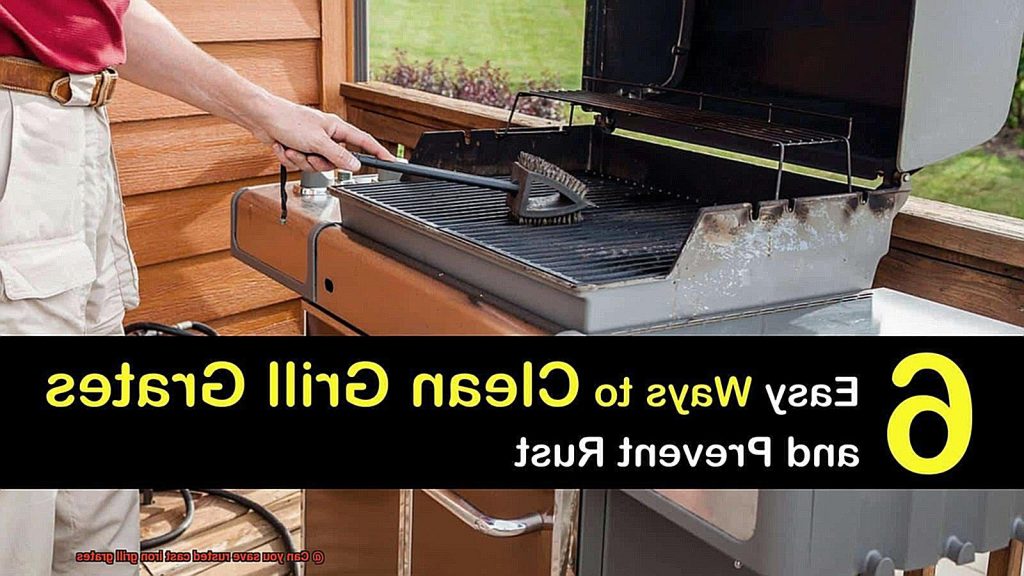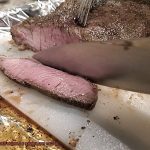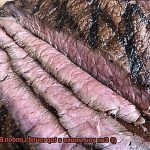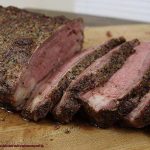Are you a grill master who takes pride in their barbecue skills? If so, then you know how important it is to have a quality grill. But what happens when your grill grates start to rust? Not only does it detract from the aesthetic appeal of your grill, but it can also negatively impact the taste and quality of your food.
But don’t worry – as an expert in this field, I can confidently say that all hope is not lost for rusted cast iron grill grates. There are many ways to salvage them without breaking the bank on expensive tools.
In this blog post, we’ll explore whether or not you can save rusted cast iron grill grates and provide tried-and-true methods for restoring them to their original form. First, we’ll discuss what causes grill grates to rust and then dive into some effective cleaning techniques. We’ll also cover how to maintain your grates to prevent future rusting.
So if you’re tired of tossing out rusty grill grates every year and want to learn how to make them look brand new again, keep reading. We have plenty of tips and tricks up our sleeves that will save you time, money, and help preserve the environment.
Contents
What Causes Cast Iron Grill Grates to Rust?
They are prone to rusting if not properly cared for. Rust is a result of the oxidation process that occurs when iron is exposed to oxygen and moisture. When left unchecked, rust can eat away at the metal, causing irreparable damage.
One of the main causes of cast iron grill grate rust is exposure to moisture. Whether it’s from rain, dew, or humidity in the air, moisture can create a chemical reaction that leads to rust formation. To prevent this, it is essential to keep your grill grates dry when not in use and cover them during inclement weather.
Acidic substances also contribute to rust formation on cast iron grill grates. Foods like tomatoes, citrus fruits, and vinegar can corrode the iron over time. To prevent this, it’s crucial to clean your grill grates after each use and avoid leaving any acidic residue behind.
Improper storage can also lead to rust formation on cast iron grill grates. If stored outside or in a damp environment, moisture can build up on the surface of the metal and lead to rust formation. It is essential to store your grill grates in a dry place when not in use and keep them clean and free of debris.
If you find rust on your grill grates, don’t panic. There are several methods for removing rust, such as using coarse salt and a potato or baking soda and water. In more severe cases, vinegar or a commercial rust remover can be used.
How to Remove Rust from Cast Iron Grill Grates
Rust can quickly accumulate on your grill grates, leading to an unsightly appearance and an unpleasant taste on your food. Here are some steps to remove rust from your cast iron grill grates and prevent it from forming in the future.
Scrub off Loose Rust
Start by removing any loose rust or debris using a wire brush or steel wool. A scraper can be used to remove stubborn rust spots.
Wash with Soap and Water
Wash the grill grates with soap and water to remove any remaining rust or debris. Rinse thoroughly and dry with a towel.
Use Vinegar or Baking Soda
Vinegar and baking soda are two household items that can be used to remove rust from cast iron grill grates. Mix equal parts of vinegar and water in a spray bottle and spray the solution onto the grates.
Let it sit for 10-15 minutes before scrubbing with a brush or steel wool. Rinse thoroughly and dry with a towel.
Alternatively, mix baking soda and water to create a paste and apply it to the rusted areas of your grill grates. Leave for 15-20 minutes before scrubbing with a brush or steel wool. Rinse thoroughly and dry with a towel.
Season the Grates
After removing the rust, season your grill grates to prevent future rusting. Apply a thin layer of oil to the grates and heat them on high temperature for 15-20 minutes. Let them cool down before using them for cooking.
Proper Storage
To prevent future rusting, store your grill grates in a dry location when not in use and clean them regularly after each use. This will help to remove any moisture or debris that could lead to rust formation.
Method 1: Coarse Salt and Potato
Before you do, make sure your cast iron grill grates are rust-free with the help of Method 1: Coarse Salt and Potato. This popular and affordable solution requires only two ingredients: coarse salt and potato.
Coarse salt is the secret weapon in this method, acting as a natural abrasive that removes rust efficiently. Meanwhile, the potato’s natural cleaning properties aid in the rust removal process. To begin, start by cleaning your grill grates with soap and water to remove any loose debris or dirt.
Next, cut a potato in half and dip the cut side into coarse salt. Use the salted potato to scrub all areas of the grill grates thoroughly, paying particular attention to areas with rust buildup. As you scrub, you’ll notice that the coarse salt and potato work together to form a paste-like substance that sticks to the grill grates, breaking down the rust and lifting it away from the cast iron surface.
After several minutes of scrubbing, rinse the grill grates with water and dry them completely with a towel. Repeat this process as needed until all rust buildup is removed. Note that this method may not work for severe cases of rust buildup or if the cast iron is severely damaged.
Remember to use caution when handling coarse salt and ensure that it does not come into contact with any open wounds or sensitive skin. However, with proper care and maintenance, your grill grates can be restored to their original condition in no time.
Method 2: Baking Soda and Water
Don’t let rust buildup on your cast iron grill grates ruin your summer cookouts. If you’re looking for a gentler option than vinegar that requires less scrubbing, Method 2: Baking Soda and Water might just be your new go-to.
Creating a paste of baking soda and water is the first step in this method, with the texture being similar to toothpaste. Once you’ve got your paste mixed up, apply it generously to the rusted areas of your grill grates. The magic begins once you let the paste sit for about 30 minutes and give it time to penetrate the rust.
After letting the paste work its magic, grab a stiff-bristled brush and start scrubbing away at the rust. You should notice that it comes off much easier than before, saving you from having to wear out your arm muscles trying to remove stubborn rust spots. Rinse the grates thoroughly with water and dry them completely. If there are still some pesky rust spots remaining after your first attempt, simply repeat the process until they’re gone for good.
One significant benefit of using baking soda over vinegar is that it’s much less acidic, which means it won’t damage the seasoning on your cast iron as easily. Thoroughly drying the grates after using this method is crucial in preventing any new rust from forming.
Overall, using baking soda and water to remove rust from cast iron grill grates is an easy and effective method that can save you time and effort in the long run. Here’s a quick recap of the steps:
- Mix baking soda and water to create a paste.
- Apply paste generously to rusted areas of grill grates.
- Let sit for 30 minutes.
- Scrub away rust with stiff-bristled brush.
- Rinse grates thoroughly with water and dry completely.
- Repeat process if necessary.
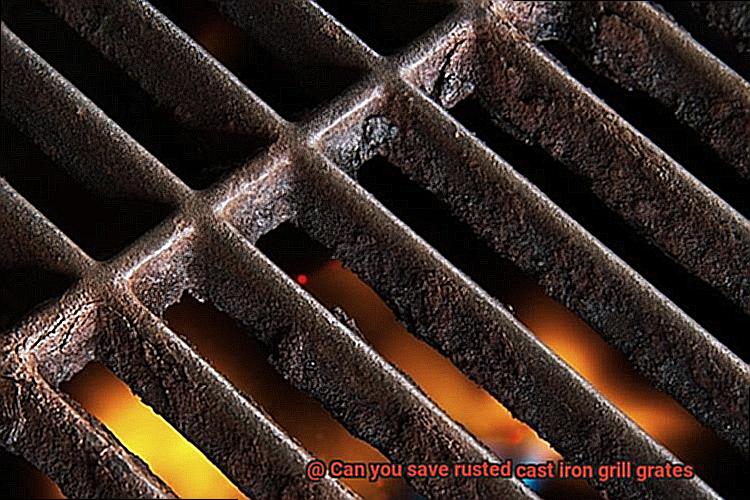
Method 3: Vinegar or Commercial Rust Remover
Let’s start with vinegar – a household item that can do wonders. First, remove the grates from your grill and rinse them off with water. Then, soak the grates in a solution of equal parts white vinegar and water for several hours or overnight.
The acidity of the vinegar will break down the rust, making it easier to scrub off with a wire brush or steel wool. After scrubbing, rinse the grates thoroughly with water and dry them completely before reattaching them to your grill.
If you’re looking for a faster solution, commercial rust removers may be your best bet. These products can be found at most hardware stores in various forms such as sprays, gels, or liquids. However, be sure to read the instructions carefully and wear protective gloves when using them.
After applying the product, let it sit for the recommended amount of time before scrubbing off the rust with a wire brush or steel wool. Rinse the grates thoroughly with water and dry them completely before putting them back on your grill.
Keep in mind that both vinegar and commercial rust removers can be harsh on your skin and eyes. So, always wear protective gear when handling these products. Moreover, test these methods on a small area of your grill grates first to ensure they won’t damage or discolor the metal.
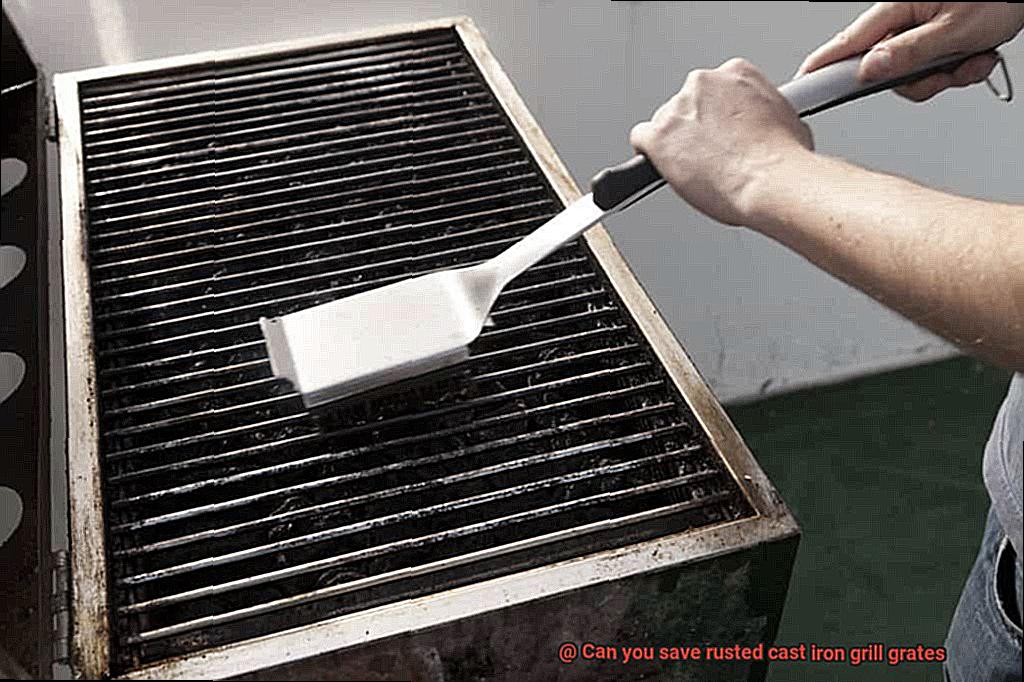
Preventing Future Rust on Cast Iron Grill Grates
They distribute heat evenly, making cooking a breeze. However, if not maintained properly, they can be prone to rust formation. Rust not only affects the appearance of your grill grates, but it can also affect the taste of your food. So, how can you prevent future rust on your beloved cast iron grill grates?
First and foremost, seasoning your grill grates is essential. Take some oil and coat your grill grates thoroughly. Then, heat them until the oil polymerizes and creates a non-stick surface. Not only does this prevent food from sticking to the grates, but it also acts as a protective layer against rust. Experts recommend seasoning the grill grates every time you use them or at least once a month.
Keeping your grill grates clean and dry is another crucial step in preventing rust formation. After every use, use a grill brush or scraper to remove any leftover food and debris from the grates. Then, wipe them down with a dry cloth or paper towel to remove any moisture. Moisture is not your friend when it comes to preventing rust on your grill grates.
Investing in a cover for your grill is an excellent way to protect your cast iron grill grates from environmental factors that cause rust formation. Rain, snow, and high humidity levels can all contribute to rust formation – so keep them covered. If you don’t have a cover, store your grill in a dry place when it’s not in use.
Lastly, it’s important to be mindful of the cleaning tools and products you use on your cast iron grill grates. Avoid using harsh chemicals or wire brushes that can damage the seasoning layer on the grates and promote rust formation. Instead, use mild soap and warm water with a soft-bristled brush or sponge to clean them.
Seasoning Your Grill Grates
Before you dive into your favorite recipes, it’s essential to make sure your grill grates are seasoned and ready to go. Seasoning your grill grates is a crucial step in maintaining the longevity and durability of your cast iron grates, ensuring mouth-watering, perfectly cooked meats and vegetables.
So, what exactly is seasoning? It’s the process of coating your grill grates with oil and heating them to high temperatures. This creates a non-stick surface that prevents rusting and ensures your food won’t stick to the grates. Here are some easy steps you can follow to season your grill grates like a pro:
Step 1: Clean Your Grates
Before seasoning your grill grates, make sure they’re clean. Use warm soapy water and a soft-bristled brush or sponge to remove any rust or debris from the surface of the grates. Rinse them thoroughly and dry them completely before moving on to the next step.
Step 2: Apply Oil
Next, apply a thin layer of vegetable oil or flaxseed oil on the surface of the grates. Use a brush or cloth to evenly coat the entire surface of the grates, including the edges. Be careful not to use too much oil as this can create a sticky residue on your grill grates.
Step 3: Heat Up Your Grill
Preheat your grill to a high temperature and place the oiled grates on the grill. Close the lid and let the grates heat up for 15-20 minutes or until they turn a dark brown color. This will create a non-stick surface that will ensure your food won’t stick to the grates.
Step 4: Wipe Off Excess Oil
Once your grill grates have cooled down, wipe them with a clean cloth or paper towel to remove any excess oil. Your grill grates are now seasoned and ready for use.
Remember to season your grill grates periodically throughout the year, especially if you use your grill frequently. This will help prevent rusting and keep your grill grates in top condition for years to come.
Storing Your Grill Grates Properly
As a true grill master, you know that maintaining your grill’s quality is not just about the seasoning of your cast iron grates. Storing your grill grates properly can make all the difference in prolonging their lifespan and keeping them rust-free. So let’s dive into some expert tips on how to store your grill grates like a pro.
Firstly, after every use, it’s important to clean your grill grates thoroughly and dry them completely. This will prevent moisture from settling on them and causing rust to form. Make sure you use a good brush and cleaner to remove any remaining food debris and then dry them off completely with a towel.
Once your grill grates are nice and dry, here are a few options for storing them:
- Hang them vertically on a wall using hooks. Not only does this save space but it also allows air to circulate around the grates, which helps prevent moisture from building up. Plus, it gives you the chance to show off your shiny, clean grill grates like the work of art they are.
- Store them in a plastic bin with a lid. This will protect them from dust and any other debris that may accumulate, while still allowing for airflow. Just make sure the grates are completely dry before placing them in the bin.
Now, if you’re planning on storing your grill for an extended period of time, such as during the winter months, it’s crucial to remove the grates from the grill and store them separately. This will prevent any moisture or condensation from forming on the grates and rusting them over time. Trust us, you don’t want to face a rusty mess when it’s time to fire up your grill again.
Cleaning Your Grill Grates Regularly
We have some expert tips on how to keep your grill grates clean and performing at their best.
Cleaning your grill grates regularly is crucial for maintaining their longevity and performance. Over time, grease, grime, and food particles can accumulate on the grates, leading to rust and corrosion. This build-up can also affect the flavor and quality of your food. To avoid these issues, follow these tips:
Clean your grill grates after every use. Use a wire brush or scraper to remove any excess debris, then use a grill spray or solution to break down any stubborn residue.
Heat is also an effective cleaning method. Turn up the heat on your grill after cooking to burn off any remaining food particles. Once the grates cool down, use a brush or scraper to remove remaining residue.
Mix baking soda and water into a paste and apply it to the rusted areas. Let it sit for several hours before scrubbing it off with a wire brush or scraper.
T0DprmoMyRY” >
Conclusion
In summary, don’t toss out your rusted cast iron grill grates just yet. With the right techniques and upkeep, you can salvage them and enjoy delicious grilled meals for years to come. Rust is a common issue caused by moisture, acidity, and improper storage. But fear not – there are several methods to remove rust from your grill grates.
For instance, you can use coarse salt and a potato or a mixture of baking soda and water to scrub away the rust. Alternatively, vinegar or commercial rust removers can also do the trick. Once the rust is gone, it’s important to season your grates properly to prevent future corrosion. This involves coating them with oil and heating them up to create a non-stick surface.
To avoid future rusting altogether, keep your grill grates clean and dry after each use. Invest in a cover for your grill to shield it from environmental factors that promote rust formation. And be mindful of the cleaning tools and products you use on your cast iron grill grates. Proper storage is also key.
Regular cleaning of your grill grates is essential for maintaining their longevity and performance. Grease build-up, food particles, and other debris can affect the flavor and quality of your food.

